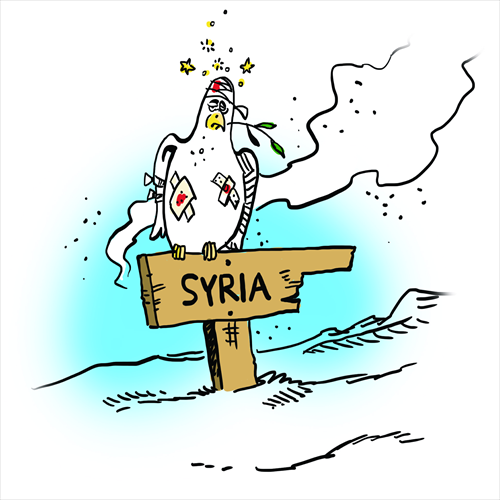Diplomatic solution lets all claim victory, bar rebels

Illustration: Liu Rui/GT
Although it remains unclear if Russia's proposal for an international mission to secure and ultimately dispose of Syria's chemical weapons will be implemented, it has dramatically changed the political calculus surrounding the Syrian conflict. Perhaps most unusually, it is an agreement that allows every party to claim victory, even if some will benefit from its successful implementation more than others.
At the very least, Russia's proposal has delayed or averted a US-led strike on Syrian forces and headed off what promised to be an extremely ugly showdown in the UN Security Council (UNSC). US President Barack Obama has agreed to drop demands that any UNSC resolution include a provision for the use of force against Syria in case of noncompliance.
For Obama, this agreement, at least partially spurred by remarks from US Secretary of State John Kerry, provides a face-saving way to extract the US from what increasingly seemed to be a no-win situation.
Both the US people and Congress were deeply suspicious of military action. Furthermore, even limited strikes could easily result in the US being pulled into a quagmire that would have no easy exit strategy.
The Russian proposal allows Obama to avoid the risks of military action without being seen to retreat from his original position that Syria could not be allowed to get away with the use of chemical weapons.
Syrian President Bashar al-Assad no longer faces imminent military action. Although the US stated that it did not intend to materially change the balance of power in Syria's civil war, Assad feared that military action might eventually lead to direct military support of the rebels.
Furthermore, while the Russian proposal has increased the morale of Assad's supporters, it is almost certain to have had the opposite effect on those opposed to his regime. Already facing internal divisions and military reverses, those fighting Assad are certain to feel that the Russian proposal is a defeat for their cause.
But Russia has gained the most from this proposal. It has provided President Vladimir Putin with a wide range of political advantages. Perhaps the most important is that Russia is now seen as a nation that not only opposed foreign military intervention in Syria, but also has offered a realistic alternative, and in a way that has helped Russia once again become central to the Syrian political process.
Putin's New York Times article, with its warnings about US exceptionalism, is a thinly veiled comment on what Russia sees as the US attempts to sideline other nations in the Syrian crisis. Now, Russia can contrast its drive for a political solution with the US' seeming eagerness to abandon diplomacy in favor of military action.
Finally, by moving the negotiations back into the UNSC, Russia has demonstrated that the body remains relevant. At a time when many US commentators have been demanding that the president ignore the UNSC, Putin has made it difficult or impossible for Obama to bypass the UNSC without paying a very high political and diplomatic cost.
Even if this agreement ultimately fails, Russia will still be seen as the nation that attempted to find a diplomatic solution to the crisis, rather than relying on ultimatums backed by military force. Russia's diplomatic reputation and position will still be strengthened, especially if the failure of the proposal can be put at the feet of the US or the forces fighting against the Syrian government.
Perhaps most importantly, Putin's actions have reminded the rest of the world that Russia remains a great power.
More than a few US editorials have argued that Russia stance should be ignored when considering what to do about Syria. Putin has not only made it plain that it is impossible to do so, but has also shown that Russian political assistance may be central to extricating the US and its allies from further entanglements in Syria.
Ultimately, the greatest strength Putin's proposal has is that it benefits most of the concerned parties and so any nation attempting to sabotage it would be acting against its own self-interest.
For Russia, this diplomatic coup has ensured a growing degree of political influence in Syria and beyond.
The author is a freelance writer based in Corona, California. charlesgray109@gmail.com
Related article
Russian peace initiative offers hopes if Washington